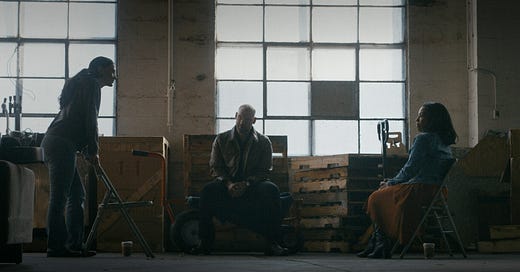Heartland: What We Do Next
Incisive writing and sharp acting make this small-scale sociopolitical drama feel huge.
For Heartland Film Festival showtimes and tickets, click here.
Up-and-coming NYC politician Sandy James (Karen Pittman) has hit a snag on her rapid ascent up the system’s ladder.
Sandy has spent years working at the street level to help provide for the poor, rehabilitate the abused, and fight for the rights of those in the margins, long before she ever stepped into political office. She has a real vision for how she can create a better New York by lifting up those who’ve been abandoned.
But years ago, she made a decision that could rip it all to shreds if her political opponents found out. Back when she volunteered at a women’s shelter, she lent her emotional support to a struggling young woman, Elsa (Michelle Veintimilla), who was being violently abused by her father. In an attempt to give her a shot at freedom from his control, Sandy gave Elsa some money.
Desperate and afraid, Elsa used that money to buy a gun and murdered her father. She was convicted and has spent the last 16 years in prison. Now, she’s out, and if she says the wrong thing to the wrong person, it could be the end of everything Sandy has built.
Sandy seeks the counsel of an old friend—and flame—Paul (Corey Stoll), a lawyer working primarily in white-collar crime. After all, he was the one who provided Sandy the money to give to Elsa. So if this news breaks, he’s caught in it too. They need to talk to Elsa before she talks to someone else.
I’m a sucker for a small cast, standing around in a room, talking about big ideas. It’s especially affecting when those ideas feel tangible and immediate to the characters’ lives and the world outside their door. Writer-director Stephen Belber, known mostly as a playwright, constructs each of the film’s time-skipping chapters as a verbal dance, as Sandy, Elsa, and Paul each court one another to see the situation from their perspective.
Pittman, Veintimilla, and Stoll are a riveting trio—they quite literally are the movie. You can feel, simultaneously, Elsa’s rage against a world that discarded her and Sandy and Paul’s trepidation about the situation, from their precarious places of power, while they try to stand by the ethics of their original decision to help her. They did the right thing by helping her, didn’t they? What gives them pause now?
Empty warehouses and conference rooms make up the bulk of the film’s locations—nearly-blank canvases to emphasize the film’s focus on the words coming out of actors’ mouths. The lightshow is in the eyes of the players, each one seeking earnestly to help one another while also protecting themselves.
The implications and ramifications of the stances each character takes spell out larger comments on the world of politics, social justice, and progressivism. What We Do Next drops us into the scenario with little information, and carefully doles out only what we need to know to understand what’s going on, leaving us as viewers to ponder on what’s actually possible and who’s holding out.
Has Sandy lost her way, in climbing the political ladder, from the grassroots warrior she once was? Is Paul genuinely trying to help, or is he trying to look good? Is Elsa telling the truth about everything that’s happened to her, or is she trying to manipulate the other two into extra favors? Belber ensures none of the three feel entirely altruistic, nor entirely self-serving, and in doing so paints a complex portrait of how things can stagnate in social politics, as pure ideals are warped and twisted by protocols, decorum, and bureaucracy when the rubber meets the road.
Though it never quite settles on clear-cut answers, What We Do Next demands that the viewer mull over the balancing act at-play in the political sphere between what’s right, what’s fair, and what’s practical. In many ways, it’s indicting of those who eagerly take political office while claiming to do so on behalf of the people. In others, it’s sympathetic to them as tragic fools trying to fight for justice in a system that ultimately doesn’t care. On both fronts, it’s resoundingly successful at burning your ass about the frustrating, often depressing reality of politicking.





